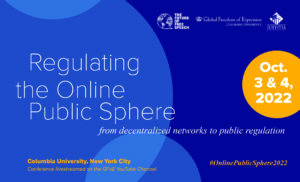Executive Director Susan Benesch will be speaking on two panels at the conference Regulating the Online Public Sphere: From Decentralized Networks to Public Regulation at Columbia University in New York City, taking place next week. “International Human Rights Law as the Basic Framework of Meta’s Oversight Board Decisions”, and “El derecho internacional de los derechos humanos como marco de las decisiones del Consejo de Supervisión de Meta”. The panels will discuss how human rights have become the basic framework of the decisions of the Board, and how legal standards originally established to protect individuals vis-à-vis limitations imposed by State authorities have been adapted to the completely different reality of privately enforcing content policies at scale.
REGULATING THE ONLINE PUBLIC SPHERE: From Decentralized Networks to Public Sphere
International Human Rights Law as the Basic Framework of Meta’s Oversight Board Decisions
Tuesday, October 4th, 2022
1:30pm – 2:45pm EST – Virtual & In-Person
Co-hosted in partnership with the Oversight Board of Meta
Moderator: Joel Simon – Fellow, Tow Center for Digital Journalism at Columbia Journalism School
Panelists:
Joan Barata – Intermediary Liability Fellow, Stanford Cyber Policy Center
Daphne Keller – Director of Program on Platform Regulation, Stanford Cyber Policy Center
Susan Benesch – Founder and Director, Dangerous Speech Project
Kate Klonick – Associate Professor of Law, St John’s University
Monroe Price – Senior Research Fellow at the Centre for Socio-legal Studies, Oxford University
Session Description:
The Meta Oversight Board was created to help “answer some of the most difficult questions around freedom of expression online: what to take down, what to leave up and why”. The Board can also make policy recommendations for changes in the way that the company operates its community standards and practices. One of the key tasks of the Board is to assess consistency between content decisions taken by Facebook and Instagram and their own internal (private) principles and rules. The overview of the decisions adopted so far by the OSB shows that the Board has used a solid human rights-based approach, putting international legal standards at the center of its internal debates and determinations. This scrutiny has even taken the Board, in some cases, to the point of criticizing Community Standards and other moderation documents as the basis for the final decision, thus recommending their repeal or reform.
The panels will discuss how human rights have become the basic framework of the decisions of the Board, and how legal standards originally established to protect individuals vis-à-vis limitations imposed by State authorities have been adapted to the completely different reality of privately enforcing content policies at scale. Another important matter for debate is to what extent the Board is a solution to be adopted by different types of platforms as a tool for better handling conflicts around content moderation and improving consistency and respect for human rights. Moreover, will this instrument reshape the legal interpretation of human rights in the digital realm? Can we expect a dialogue between the Board(s) doctrine and the standards set by international bodies and regional courts? Could decisions of the only existing oversight board end (so far) up setting the basic constitutional standards of content moderation across platforms? Would in any case this be a desirable outcome?
(ONLINE ONLY IN SPANISH)
El derecho internacional de los derechos humanos como marco de las decisiones del Consejo de Supervisión de Meta
Martes, 4 de Octubre de 2022
3:15pm – 4:30pm EST – Transmisión en vivo & En persona
Presentado en asociación con el Consejo Asesor de Contenido de Meta
Moderador & Presentación: Joan Barata – Intermediary Liability Fellow at Cyber Policy Center, Stanford University
Panelistas:
Susan Benesch – Founder and Director, Dangerous Speech Project
Agustina Del Campo – Director, Centro de Estudios en Libertad de Expresión y Acceso a la Información (CELE)
Carlos Cortés Castillo – Co-Founder, Linterna Verde

